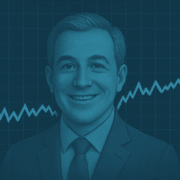Financial Forecasting (and Other Popular Myths)
Do you ever get the feeling that it’s more popular to be a pessimist than an optimist?
Have you ever noticed how bearish financial forecasters seem smarter than those who are bullish? I first heard this point from Ron Baron at the Baron’s Investor Conference this year. Since then I’ve been paying special attention to it, both in the media and in life. Baron is right, it’s a recurring pattern – one that has me concerned.
My concern is that people are buying into this pessimistic way of life, yet my 35+ years of experience has found optimists to be significantly wealthier than those with a negative outlook. I believe those who are bullish have much more financial wealth than those who are bearish. Of course this is impossible to prove without surveys, studies, and diagrams, but it is a feeling I have nonetheless. I think it stems from human nature.
It is human nature to fear loss. In fact, the fear of loss is greater than the measure of greed for gain. In economics and decision theory, loss aversion refers to people’s tendency to strongly prefer avoiding losses to acquiring gains. Some studies suggest that losses are twice as powerful, psychologically, as gains. Loss aversion was first demonstrated by Amos Tversky and Daniel Kahneman, and most recently discussed in the book Thinking, Fast and Slow.
It is interesting that the emotion of fear of the loss of something is greater than the emotion of reward for a gain.
My sense from my “just paying attention to consumer behavior” meter is that books that forecast a negative future or a catastrophe and spread fear and turmoil out-sell books that are optimistic. Yet some of my favorite books express optimism about the future, look at abundance, advancements in medicine, health, financial success in independence, prosperity and happiness. You have heard “Bad News Sells”.
Forecasting, especially financial forecasting, is a skill investors want “experts” to be able to do. Like a professional baseball player, financial economists are the only profession I am aware of that pays a “top 1%” salary despite “missing the ball” most of the time.
For example, the Wall Street Journal surveys top economists for their forecasts of interest rates, the economy, the markets, etc. Since 1982, the semi-annual forecasts for the actual direction of interest rates (not the specific rate, but just the direction) economists were wrong 40 out of 63 periods, or 63% of the time. You have better odds flipping a coin.
Why do forecasters tend to have a negative outlook? I think it is because you appear to be smarter or wiser when you have a pessimistic viewpoint. Again, “Bad News Sells”…
So why do people constantly look toward forecasters to predict the future? I think it is a learned behavior. I think it is pervasive in the media, the audience comes to expect the experts to forecast. Always keep in mind, forecasting is a difficult job – especially if you are predicting something in the future, or put a timeframe on your prediction.
So, what is an investor to do? Rather than spend time and energy on forecasts and looking for a consensus of opinions, spend time understanding a company – understand the business. What does the company do? How do they do it? What gives them an unfair advantage over their competition? How do they intend to sell more in the future, or do things faster, easier, quicker and cheaper, for the benefit of their customers/clients, and then the benefit of their owners/shareholders/stakeholders?
I believe the future is bright. Focusing on a bigger future is what optimists do. Like a muscle it needs to be constantly strengthened to overcome the loud noise of pessimism and fear. You need to train your eyes and mind to look for good news. Bad news sells. In my experience, investors who have embraced a positive or optimistic attitude more often came out on top.
I don’t foresee that changing anytime soon.
Thank you for being a client of Prosperion Financial Advisors.
Steve Booren is the Owner and Founder of Prosperion Financial Advisors, located in Greenwood Village, Colo. He is the author of Blind Spots: The Mental Mistakes Investors Make and Intelligent Investing: Your Guide to a Growing Retirement Income and a regular columnist in The Denver Post. He was recently named a Barron’s Top Financial Advisor and recognized as a Forbes Top Wealth Advisor in Colorado.









